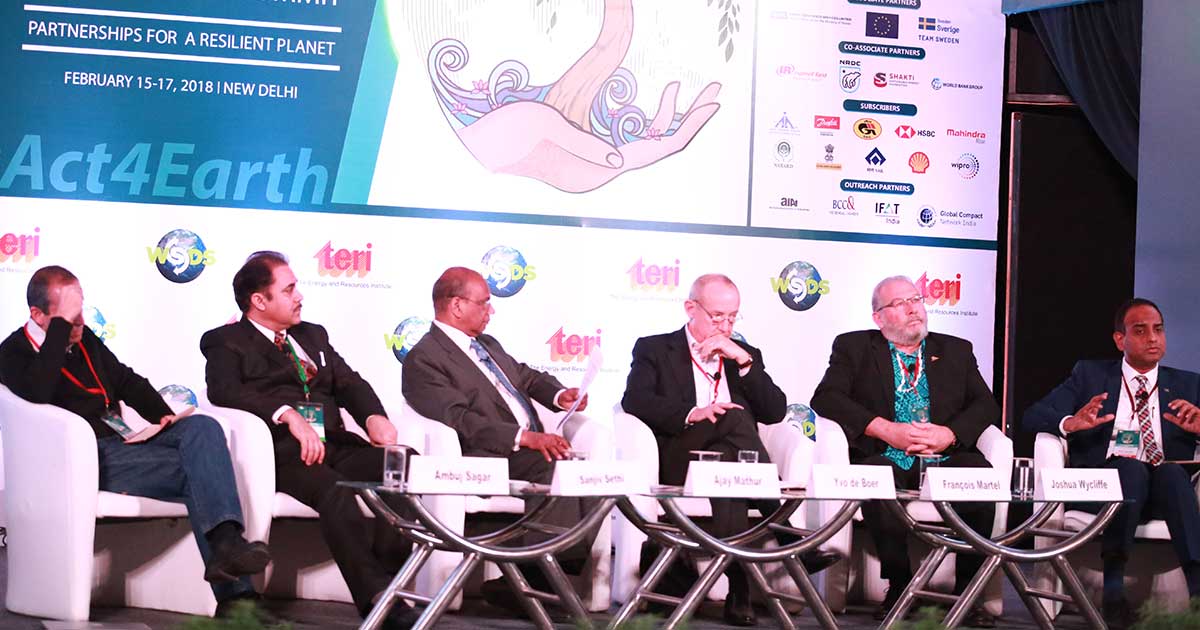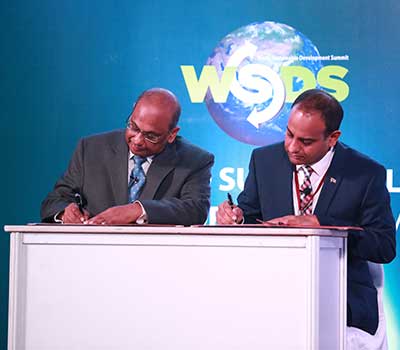
Cementing ties: Fostering South-South partnerships
 Environment leaders and policymakers convene at WSDS2018 to foster South-South cooperation
Environment leaders and policymakers convene at WSDS2018 to foster South-South cooperation
The world's socio-economic landscape is evolving at a rapid pace. The first decade of the 21st century has paved the way for accelerated growth in the economies of certain countries in the Global South. Today, the growing need for regional cooperation has been further escalated as a by-product of globalization as well as the present environmental crisis. There are several good practices that can be found in the global South in terms of policies, institutions, and programmes that can accelerate sustainable human development and mitigate climate change issues.
Today, development and environmental challenges facing the developing countries are different in many ways from developed countries. The solutions, therefore, must be properly rooted in each country’s context. North-South links remain important but there is great value in a South-South focus on sharing learning and experience on transforming approaches between developing countries.
At a special session in the ongoing WSDS 2018, an eminent panel of environmentalists, ex-diplomats, and policymakers, including Mr Yvo de Boer, Founder, Responsibility and Former Executive Secretary, UNFCCC, and Mr Joshua Wycliffe, Permanent Secretary for Local Government, Housing and Environment, Government of Republic of Fiji, convened at the WSDS 2018 to deliberate on ways in which Southern think tanks can work together to address NDC implementation gaps.
NCDs and developing countries
 Hand-in-hand: MoU signing on the Declaration of Partnership between Government of Republic of Fiji & TERI
Hand-in-hand: MoU signing on the Declaration of Partnership between Government of Republic of Fiji & TERI
At the recently ended COP 23 in Bonn that was presided over by Fiji, one of the key decisions was on operationalizing the ratchet-up of ambition through the Talanoa dialogue. This is essential to establish a backbone of strong facilitative dialogue process and essential in ratcheting up ambition. The current political context, however, is complicated and parties need strong support on capacity and analytical tools.
Speaking on this, Mr Ambuj Sagar, Head of the School of Public Policy, Indian Institute of Technology, Delhi, said, "The NDCs that the developing countries have undertaken to achieve are very ambitious. The level of ambition is only going to ratchet up over time. While developing countries think and plan to achieve these NDCs, they need to worry about a range of other development challenges. And what that leads to is a very complex landscape where developing countries’ policymakers and other actors must think about how they will achieve these very ambitious commitments with the limited resources they have at hand, while at the same time taking care of other development objectives."
Need for South-South cooperation
Mr Yvo de Boer, Founder, Responsibility and Former Executive Secretary, United Nations Framework Convention on Climate Change (UNFCCC), believes that a great deal of risk that stands in the way of achieving the Paris goals and certainly in the case of the private sector engaging, is non-financial policy related risks. To understand that policy-related risks at a national level is something one can do best by engaging with counterparts from their own region who have explored similar challenges and have found solutions that are relevant to their setting, rather than adopting the approaches of an industrialized country. He believes that "the relevance to the risk agenda can best be compressed by deploying local knowledge".
"It is not just the 'what' of what policies and business models, but also the 'how’ of how countries have been able to put together these processes," added Mr Sagar.
Agreeing with this, Mr Joshua Wycliffe, Permanent Secretary for Local Government, Housing and Environment, Government of Republic of Fiji, said there is a strong need for South-South cooperation as it will offer a key set of opportunities to the developing countries to implement their NDCs.
Cementing this agreement, a Memorandum of Understanding was signed at the session on the Declaration of Partnership between Government of Republic of Fiji & TERI.